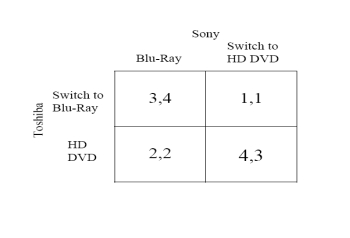DVD Player Game
In 2006, there were a number of media reports about the next generation of DVD players, which produce much clearer picture and sound than that produced by current machines. However, there are two competing formats, Blu-ray (Sony) and HD DVD (Toshiba) . Both are affiliated with certain movie studios, which have agreed to release their movies in one or the other of the new formats. This creates a problem for the producers of this new technology-they all want their own version to win out, but by competing they make it entirely likely that most consumers will sit back and wait until (a) one of the formats is a clear winner or (b) a newer, even better, method of supplying movies is developed by someone else. If the latter happens, both Sony and Toshiba lose out.
Imagine that both companies have developed a new product, but with different formats. If one of the companies would be willing to switch quickly (assume that copyright laws would allow it to produce something similar) , that company would lose some time and market share but be able to get into the market. Consumers would be more willing to buy the new technology, and both companies would make more money. If neither company is willing to coordinate with the other, they end up in a war of attrition, with fewer customers. This is shown in the game below.

-What payoff would Toshiba get if it chose to produce HD DVD and Sony chose to produce Blu-Ray?
Definitions:
Declarative Selves
Aspects of an individual's self-concept that are consciously acknowledged and can be verbally communicated to others.
Procedural Selves
Conceptual frameworks relating to the aspect of self that is concerned with the processes of self-regulation and goal achievement.
Implicit Self
A component of self-concept that consists of unconscious and automatic self-references and attitudes that influence one's behavior and perceptions.
Self-schema
Cognitive structures that represent how we think about ourselves in different contexts, guiding our behavior and perceptions.
Q3: The economic growth rate in Bangladesh in
Q5: Compare your answers to the questions that
Q6: All of the following are stages in
Q8: Key performance indicators including customer satisfaction, share
Q27: Does Arrow's theorem apply to majority rule
Q28: We are able to use the concepts
Q35: What is the key independent variable?<br>A) economic
Q36: No electoral rules allow a perfectly proportional
Q42: Classic modernization theory relies on an empirical
Q43: What is (are) the Nash equilibrium (equilibria)